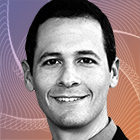

Stanford Graduate School of Business finance professor Joshua Rauh has always been interested in the intersection of public policy and economics. In 2000 the Boston-area native left his job as an associate economist with Goldman Sachs International in London to pursue a Ph.D. at the Massachusetts Institute of Technology under the tutelage of award-winning economist James Poterba, president of the National Bureau of Economic Research, who has spent much of his 30-year career focused on public policy. “I really learned from Jim a very empirical approach to research that carries me through today,” says Rauh, 40, who taught at the University of Chicago Booth School of Business and Northwestern University’s Kellogg School of Management before moving to Stanford in 2012. Rauh is best known for his work with former University of Chicago colleague Robert Novy-Marx; the two published a 2009 paper that asserted U.S. state-sponsored pension plans were underfunded by $3.2 trillion, not the $1 trillion the Pew Charitable Trusts was reporting. The main reason for the discrepancy: Rauh and Novy-Marx applied standard financial theory to the problem and calculated future liabilities employing the risk-free interest rate rather than the typical practice among states of using expected investment returns (about 8 percent at the time). Rauh’s latest research is even more troubling. In a working paper analyzing the pensions of ten U.S. cities from 2009 to 2013, the Stanford economist found that total unfunded liabilities had increased 40 percent, to $359 billion, despite a 75 percent increase in the S&P 500 index during the period and some pension benefit reforms. “The growth in unfunded liabilities needs to be halted,” Rauh says. His paper provides a “road map forward,” suggesting that cities consider structural changes including 401(k)-like retirement plans, pooled defined contribution and cash balance plans, and deferred annuity plans.








































